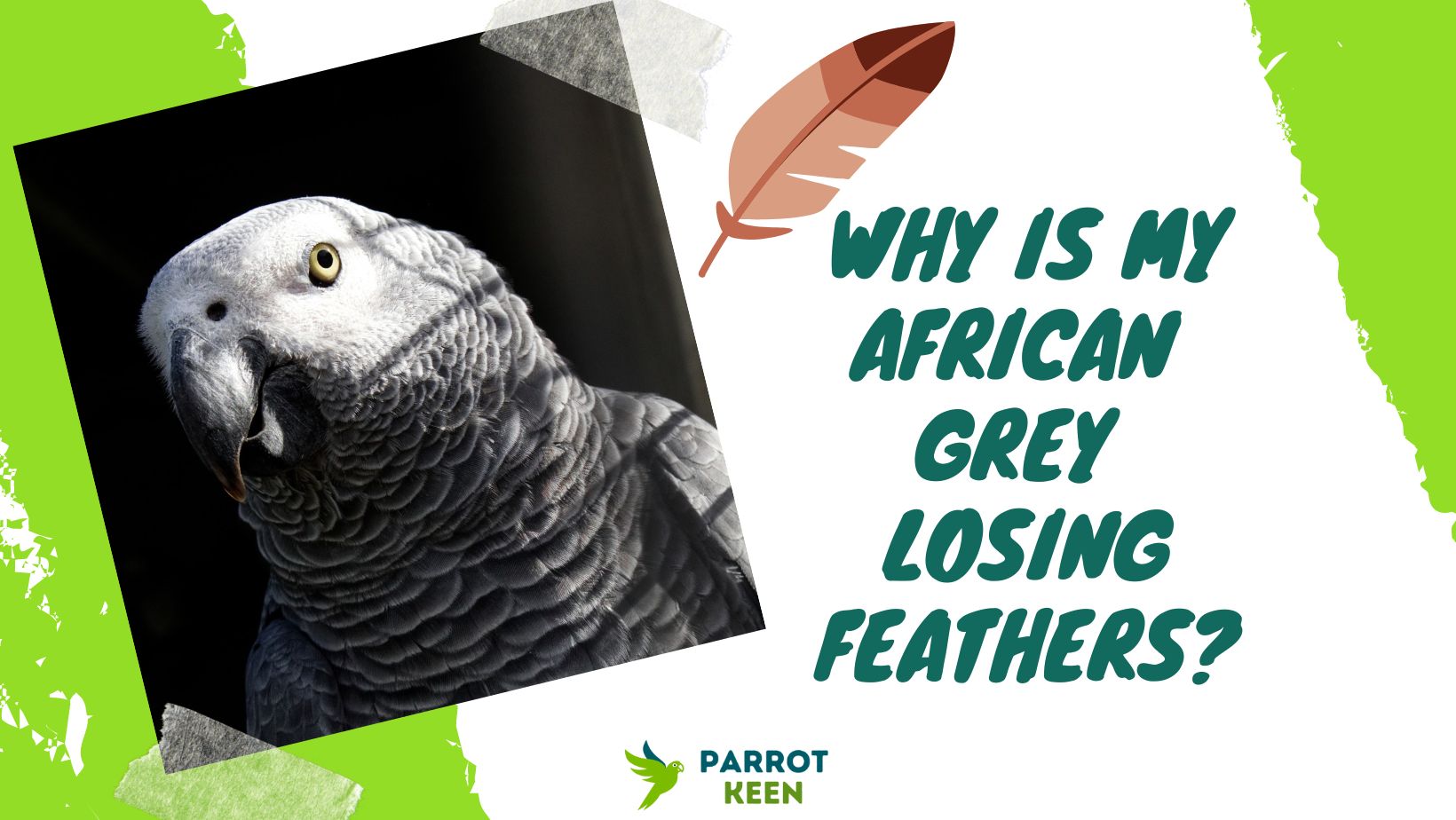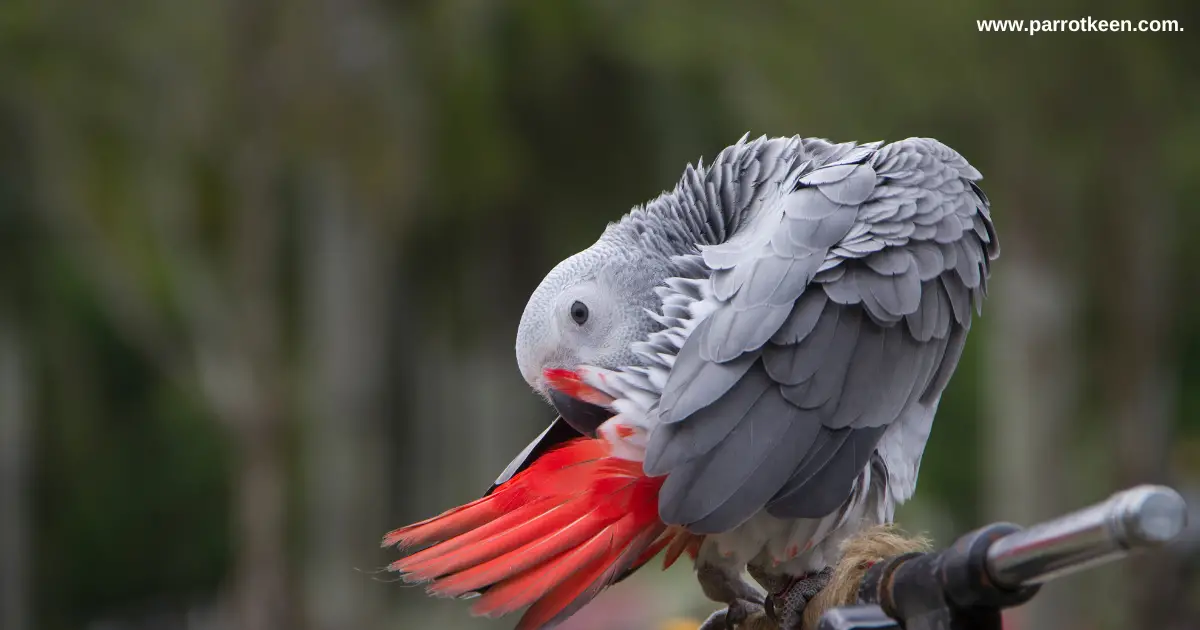
Why Is My African Grey Losing Feathers?
African greys are known for their beautiful feathers, but what do you do when your bird starts losing them? This can be a cause for concern, but in most cases, it is not a sign of anything serious.
Losing feathers is a common problem among African greys. In some cases, it can be due to poor nutrition or a lack of environmental stimulation.
However, in many cases, feather-plucking is caused by stress. If your African grey is losing feathers, there are several things you can do to help it feel better and stop plucking.
In this blog post, we will explore the possible reasons why an African grey might be losing its feathers and how to address the issue.
Keep reading to learn more!
Why is my African Grey Losing Feathers?
African grey parrots are known for their beautiful plumage, which can range in color from deep charcoal to bright silver.
However, these birds are also susceptible to feather loss, which can be caused by a number of factors, including:
-
Skin Disease
If your African grey is losing feathers, it could be due to a skin disease. Skin diseases are fairly common in African greys, and they can cause the bird to lose its feathers.
A few skin diseases like Viruses and bacteria can affect African greys, so it’s important to take your bird to the vet to get a diagnosis.
Once the vet has diagnosed the problem, you can start treatment and hopefully get your bird’s feathers back to normal.
-
Due to poor diet (Malnutrition)
Another reason why your African grey might be losing feathers is because of a poor diet. African greys need a diet that is high in protein and low in fat.
If your bird isn’t getting enough protein, it can start to lose its feathers. You should talk to your vet about what kind of diet is best for your bird and ensure that you feed it high-quality food that will meet its nutritional needs. With a good diet, your bird’s feathers should start to grow back in no time.
-
Due to stress
Stress is another possible cause of feather loss in African greys. If your bird is stressed, it can start to lose its feathers. There are a number of things that can cause stress in birds, so it’s important to try to identify the source of the stress and remove it from the bird’s environment.
If you can’t remove the stressor, you may need to talk to your vet about giving your bird some medication to help reduce its stress levels.
-
Molting Phases
According to the website parrot encyclopedia, an African grey parrot generally molts once or twice a year. During this time, they will lose feathers and grow new ones.
This is a normal process and should not be cause for alarm unless your bird is losing feathers outside of its molting period or if they are losing an abnormal amount of feathers.
If you are concerned about your bird’s molting, consult with a vet or experienced African grey owner.
-
Your Parrot Could Be Feather Plucking
If your African grey is losing feathers and you can’t figure out why there’s a chance your bird could be feather plucking. Feather plucking is a common behavior among parrots.
If your bird is plucking its feathers, it’s important to get to the root of the problem so you can provide the appropriate care.
Once you know what’s causing the feather plucking, you can take steps to address the issue and help your bird start growing back its beautiful feathers.
Do African Grey Feathers Grow Back?
You might have asked yourself, will my parrot’s feathers grow back? The answer is yes and no. These majestic birds are also notorious for their feather-plucking behavior, leaving them with unsightly bald patches.
While some aficionados believe that plucking is a sign of stress or boredom, it is actually a self-soothing behavior that many parrots engage in when they feel anxious or stressed.
The good news is that, in most cases, feathers will grow back after they have been plucked or lost. However, regrowth may not be possible if the follicle has been damaged.
For this reason, it is important to consult with an avian vet if you notice your parrot engaging in excessive feather loss or plucking.
With proper care and treatment, your parrot can once again enjoy full and healthy plumage.
How Long Does It Take for African Grey Feathers to Grow Back?
It is difficult to say how long it will take for your African grey’s feathers to grow back, as it depends on the individual bird. However, the average time is 12 months, or possibly longer. This is because African greys have a high amount of feathers compared to other bird species.
You can do several things to help ensure that your parrot’s feathers grow back healthy and strong.
First, ensure your bird has a nutritious diet, as this will give them the necessary nutrients for feather growth. Ensure you give your parrot premium pellet formula and a variety of fresh fruits and vegetables rich in Vitamin A.
Second, please provide them with plenty of toys and perches to keep their muscles active, and their minds occupied. Also, give them plenty of love and attention, which will help reduce stress levels and promote healing.
Following these simple tips can help your African grey feathers grow back in no time.
How to Treat Feather Loss In African Grey?
One common health issue in African grey parrots is feather loss. While there are several possible causes of feather loss, including stress, nutritional deficiencies, and parasites, the most common cause is poor grooming habits.
If your African grey is experiencing feather loss, you can do a few things to help treat the problem.
-
Take your parrot to the vet:
In order to rule out any possible medical causes of feather loss, it is crucial to take your parrot to the vet for a check-up. Your vet will likely recommend a course of treatment if a medical condition is causing the feather loss.
-
Ensure your bird gets enough sun:
Sunlight is essential for a bird’s health and can help promote healthy feather growth. If your bird is kept indoors, provide a UVB light source.
-
Check your bird’s diet:
Diet plays a vital role in a bird’s health and can also affect feather growth. Make sure your bird is getting a balanced diet that includes plenty of fresh fruits and vegetables and high-quality pellet food. You may also want to supplement your bird’s diet with vitamins specifically designed for birds.
These steps can help treat your African grey’s feather loss and promote healthy new growth.
Is my African Grey Molting Or Plucking Feathers?

If you have an African grey parrot, you may be wondering if your feathered friend is molting or plucking feathers. While molting is a natural process that all birds undergo periodically, feather plucking can signify stress or illness.
One way to tell the difference is to look at the pattern of feathers that are lost. Molting usually occurs in a specific order, starting with the head and working down the body.
In contrast, feather plucking is often more random and erratic. If you suspect your bird is plucking feathers, it’s important to take them to a veterinarian for a check-up.
Plucking feathers can lead to health problems, so getting help from a professional is crucial if your bird is exhibiting this behavior.
Why Is My African Grey Losing Feathers Around its Neck?
While feathers are designed to protect a bird’s body from the elements, they can also be a source of irritation. Suppose your African grey’s feathers are falling out in a small area. In that case, it might be because that area is infected or irritated.
In some cases, feather loss may also be caused by the other birds in the cage preening on their companion. This prevents it from having enough feathers for protection and leaves patches where there used to be all those plucked off before they grew back!
If you suspect your bird is plucking feathers due to stress or boredom, try providing additional perches and toys to keep them occupied. If the problem persists, it’s best to consult an avian veterinarian to rule out any underlying medical conditions.
What Happens When An African Grey Loses its Tail Feathers?
When a bird loses its tail feathers, it is typically not a cause for alarm. In most cases, the feathers will grow back quickly, as birds have a high rate of feather regeneration.
This process is often part of molting, during which birds shed their old feathers and grow new ones. However, if the tail feathers are pulled out forcefully, they may take longer to grow back. In addition, if the quills beneath the feathers are damaged, it can interfere with regrowth.
If you are concerned about your bird’s tail feathers, it is best to consult an avian specialist. They will be able to assess the situation and advise on how to best support your bird during this time.
Conclusion: Why Is My African Grey Losing Feathers?
In conclusion, if you ask yourself, “Why is my African grey losing feathers?” there could be a few reasons. The best thing to do is rule out any medical causes with your avian vet first.
If your bird is plucking its feathers due to boredom, stress, or anxiety, there are a few things you can do to help, which we have listed above.
The most important thing is to be patient and consistent with your bird, as it will take time and effort to help them overcome their feather-plucking behavior.
If you have any questions or concerns, please consult your avian veterinarian. They will be able to help you determine the cause of your bird’s feather loss and create a treatment plan accordingly.
Please share this article with other African grey owners who may be struggling with the same problem.

Hi, I am Thersa and Welcome to ParrotKeen, your number one place to get all the information you need about your cute parrot. I hope You Find it useful.
